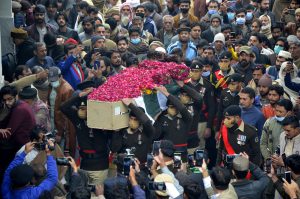The last two weeks has raised major red flags for Pakistan’s security apparatus, especially in Balochistan where the Pakistan army lost several of its soldiers in three different major terrorist attacks. First, on January 25, terrorists attacked Kech, Balochistan, which is located near the country’s western border with Iran, roughly 600 km south of provincial capital Quetta. Over 10 Pakistani military personnel were killed in that terrorist attack. Just over a week later, on February 2, another terrorist plot unfolded in Noshki and Panjgur districts of the same province. Although the Noshki attack was repulsed within hours, the standoff in Panjgur lasted for more than 60 hours and resulted in the death of seven military personnel, including an officer.
According to a statement issued by the Pakistani military’s press wing, more than 20 terrorists were killed in these attacks. The Balochistan Liberation Army, a separatist group in Balochistan, claimed responsibility for the attacks, claiming to have killed “more than 100 enemy personnel” in Noshki and Panjgur.
Later, Prime Minister Imran Khan and Army Chief General Qamar Javed Bajwa visited Noshki to boost the morale of the troops and pay tribute to the martyrs, a symbolic move often deployed by leaders in Islamabad after large attacks.
The recent attacks underline a surge in terrorist activities that Pakistan has witnessed since the Taliban took control of Kabul, Afghanistan last year. An Islamabad-based think tank, the Pakistan Institute for Peace Studies, recently published a report endorsing the fear that Pakistan has been slowly sliding into chaos and instability for the last couple of years.
These terrorist activities were mostly carried out by banned outfits including the Tehrik-i-Taliban Pakistan (TTP) and the Baloch Liberation Army (BLA).
In January alone, several terrorist incidents rocked Pakistan as terrorists targeted major cities including Islamabad and Lahore. In another terrorist attack, unidentified motorcyclists shot a Christian priest and injured his companion in Peshawar. Police suspect the Islamic State to be behind the attack. Based on the trends emerging from and tactics employed in recent terrorist attacks, security experts believe that a TTP-BLA-IS nexus is in the making. The three terrorist groups have supposedly clubbed their resources and ambitions for a pitched battle against the state machinery.
This theory was supported by Interior Minister Sheikh Rasheed Ahmad during his appearance on a TV talk show. Ahmad said, “I think that TTP, Daesh [the local name for IS] and other separatist groups are carrying out these activities in collaboration.”
The Pakistan Army and the government both believe that such attacks are carried out using Afghan soil with the complicity of India, which seeks to sabotage Chinese investments in Pakistan. The interior minister urged authorities in all of Pakistan’s provinces to remain on their toes for the next two months to foil any terrorist attempt.
During the Senate session, Ahmad was asked by the opposition lawmakers about the status and future of negotiations with the TTP, which the Khan government had undertaken to great controversy. Ahmad responded by saying that dialogue had failed with the TTP due to its unconstitutional demands.
In another development, National Security Adviser (NSA) Moeed Yusuf visited Kabul to convey Pakistan’s concern regarding sleeper cells of the TTP and other insurgent groups in Afghanistan. He was assured that Afghan soil would not to be used to plan or conduct attacks against Pakistan. However, just a few days after Yusuf’s visit to Kabul, at least two soldiers of the Pakistan Army were killed in gunfire from across the Afghan border.
A report sharing similar concerns has also been rolled out by the U.N. Analytical Support and Sanctions Monitoring Team. The report says that between 3,000 and 5,000 fighters of the TTP are still active in Afghanistan, despite the assurances given by the Taliban regime otherwise. It also states that the group closely collaborates with al-Qaeda and Jamaat Ansarullah to plan attacks on Chinese interests in Pakistan.
Pakistan has recently unveiled its first National Security Policy, which is centered on geoeconomics rather than geopolitical security, but it is unclear about how the country should achieve economic security at home without a peaceful enabling environment in the region.
Islamabad-based security expert Muhammad Wali believes that Afghanistan’s political situation is still in limbo as not a single country has accepted the Taliban regime so far. He added that the Afghan economy is on the verge of collapse, and the country is still believed to be a haven for different terrorist outfits. Wali argued that all these developments should be a concern for Pakistan. The impending crisis may engulf Pakistan too, creating instability on the economic front, which is already struggling with inflation and low economic growth.
Furthermore, Wali said that Pakistan needs to engage the Afghan Taliban to deal with the TTP and also stressed that Islamabad should implement the National Action Plan (NAP) in letter and spirit. He also urged the government to finalize the NAP by paying heed to the 20-point plan, which was established by the Government of Pakistan in January 2015 to crack down on terrorism. Seven years later, many of its points are yet to be fulfilled, and terrorism is on the rise yet again.
































